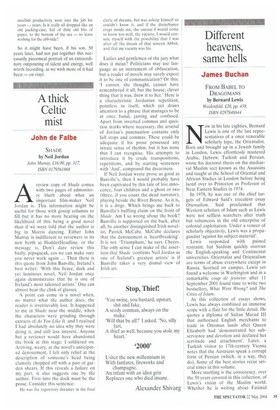A thick Celtic mist
John de Falbe
SHADE by Neil Jordan John Murray, £16.99, pp. 317, ISBN 0179561868 Areview copy of Shade comes with two pages of admonitory blurb about what an important film-maker Neil Jordan is. This information might be useful for those with gossip columns to fill but it has no more bearing on the likelihood of this being a good novel than if we were told that the author is big in Morris dancing. Either John Murray is indifferent to reviewers in its new berth at HodderHeadline, or the message is, Don't dare review this badly, pipsqueak, cos we can make sure you never work again ... Then there is this quote from John Banville, Ireland's best writer: 'With this fierce, dark and yet luminous novel, Neil Jordan once again demonstrates that he is one of Ireland's most talented artists.' One can almost hear the clink of glasses.
A point can come in a novel when, no matter what the author does, the reader is irretrievably lost. It happened to me in Shade near the middle, when the characters were grinding through extracts of As You Like It, and I realised I had absolutely no idea why they were doing it, and still less interest. Anyone but a reviewer would have abandoned the book at this stage; I soldiered on. Arriving, weary, at the novel's anticipated denouement, I felt only relief at the description of someone's head being clumsily chopped off with a pair of garden shears. If this reveals a failure on my part, it also suggests one by the author. First into the dock must be the prose. Consider this sentence: circle of dreams, but was asleep himself so couldn't know it, and if the disturbance crept inside me, the unease I would come to know too well, the vacuity, I would console myself with the possibility that I was after all the dream of that unseen Abbot, and that my vacuity was his.
Ladies and gentlemen of the jury what does it mean? Politicians may use language as an instrument of obfuscation, but a reader of novels may surely expect it to be one of communication? Or this: 'I cannot, she thought, cannot have remembered it all, but the house, clever thing that it was, drew it to her.' Here is a characteristic Jordanian repetition, pointless in itself, which yet draws attention to a phrase that manages to be at once banal, jarring and confused. Apart from inverted commas and question marks where necessary, the arsenal of Jordan's punctuation contains only full stops and commas. These could be adequate if his prose possessed any innate sense of rhythm, but it has none that I can recognise. His attempts to introduce it by crude transpositions, repetitions, and by starting sentences with `And', compound the dreariness.
If Neil Jordan wrote prose as good as Banville's, then I would probably have been captivated by this tale of lost innocence, four children and a ghost or two (three, if you count the dead narrator), playing beside the River Boyne. As it is, it is a dirge. Which brings me back to Banville's baffling claim on the front of Shade. Am I so wrong about the book? Banville is supported on the back, after all, by another distinguished Irish novelist, Patrick McCabe. McCabe declares that the denouement is 'heartbreaking'. It is not. 'Triumphant,' he says. Cheers. The only sense I can make of the assertion that Shade 'confirms Neil Jordan as one of Ireland's greatest artists' is if Banville takes a very dismal view of Irish art.


















































































 Previous page
Previous page